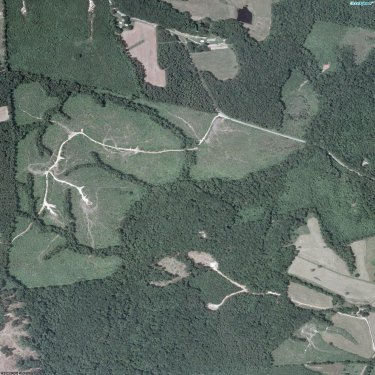
On left is our CP forest in 2004, right after a clearcut on the pines. You can clearly see the stream management zones with intact hardwoods and the boundaries of the property. On the south is Genito Creek. We own both sides of that creek on that little hump. You have to look closely to see that; We also own both sides of the road, but not very deep on the north-east side.
The best parts of government are those you hear the least about. It is because they are less controversial and somewhat apart from politics. They don’t overreach and they do the things government is designed to do, i.e. things people cannot reasonably do for themselves, things that have payoffs beyond the lives of individuals and things that promote the common good. Most of us don’t know how much our well being depends on these under-the-radar activities. You know, the ones that predict the weather, secure public health, keep track of our records etc.
Since I bought my forest land and tried to learn how to manage it well, I have been very much impressed with the activities of the U.S. and Virginia forest services and the several extension services, especially Virginia Tech. You might think I am a little self serving, since this part of government serves my interests, but I think it goes beyond that.
Land use affects all Americans and most of what happens on the land is the responsibility of private landowners. It is in the general public interest that grasslands, forests, wildlife habitat, watersheds etc be well managed. It makes perfect sense for government to help landowners do a better job of stewardship. Beyond that, land stewardship is an excellent instance of something that individual people cannot reasonably do all alone. Even the largest landowners don’t own whole watersheds or wildlife habitats and air, water, bugs and weeds don’t pay attention to property lines. There is a need for common goals and cooperation. But how?
There are many ways to work toward the common good in land use. Of course, the government could own or control all the land. This is a thoroughly discredited system, as anybody with even a passing knowledge of the abysmal ecological conditions in the Soviet Block can attest. Common ownership of land is a good idea only in theory. Whenever anything becomes everybody’s responsibility, it becomes nobody’s. On the other hand, complete freedom for land owners is also a mistake. As I wrote above, there is too much interrelatedness.
We need environmental regulations, but they need to be flexible. We have recognize the different generations of environmental regulations and how success can change the problem set. Forty years ago we needed some tough regulations to clean up big pollution. Command and control worked back in those days because we could easily identify pollution sources, which tended to be particular sources and often very toxic. As we eliminated most of the really bad pollution, it got harder to get each successive step. It doesn’t take a genius or any subtlety to find and shut down one big pipe. Finding a thousand little ones, no so easy. Beyond that, it is generally easier to solve the first 90% of any problem than the last 10% and it gets harder and harder to get at that last 1%. As you have to address more diverse and difficult to assess sources of environmental damage, you need to empower more people and engage their intelligence and imaginations to work toward solutions. Incentives work a lot better than coercion. If you order people around, you take away their responsibility and their dignity … and they take their innovations somewhere else. You cannot coerce someone into being creative. Under coercive conditions, people use their intelligence and imaginations to figure out how to avoid blame and do the minimum. If you want creative solutions, you need incentives. They need not be only monetary. Most intelligent people want meaningful things where they can be committed. The search for meaning.
Involvement v Commitment
You can understand the difference between involvement and commitment by looking at your bacon and eggs breakfast. The chicken is involved, but the pig is committed. A lot of involved people think they are committed because they feel passionately about an issue, but they wander off when passion cools, styles change or sustained hard work is required.
Responsibly should be as close as possible to the ability to makes decision and the likelihood to suffer or benefit from the results. It always annoys me when somebody tries to tell me what to do with my land. But I actively seek out the advice and experience of those who can help me make better decisions. I take my stewardship responsibilities very seriously. The Virginia DoF and Virginia Tech have been very helpful with advice. I have taken part in several courses and field days where I learned about things such as biosolids, water protection, invasive species, wildlife protection and much more. They usually cost me around only $20-50, which doesn’t cover the costs. But in return, I apply my knowledge and skill, improved by the courses, to managing my land well, which benefits all the people of Virginia, or at least those that breathe air, drink water or like wildlife.
I appreciate what the Commonwealth does to empower me to be a good steward of my forests and they seem to appreciate what educated landowners can do with the proper information and incentives. Everybody does their parts. It is a win all around. I bet most people don’t even know about this part of government. I suppose that is why it works well.
